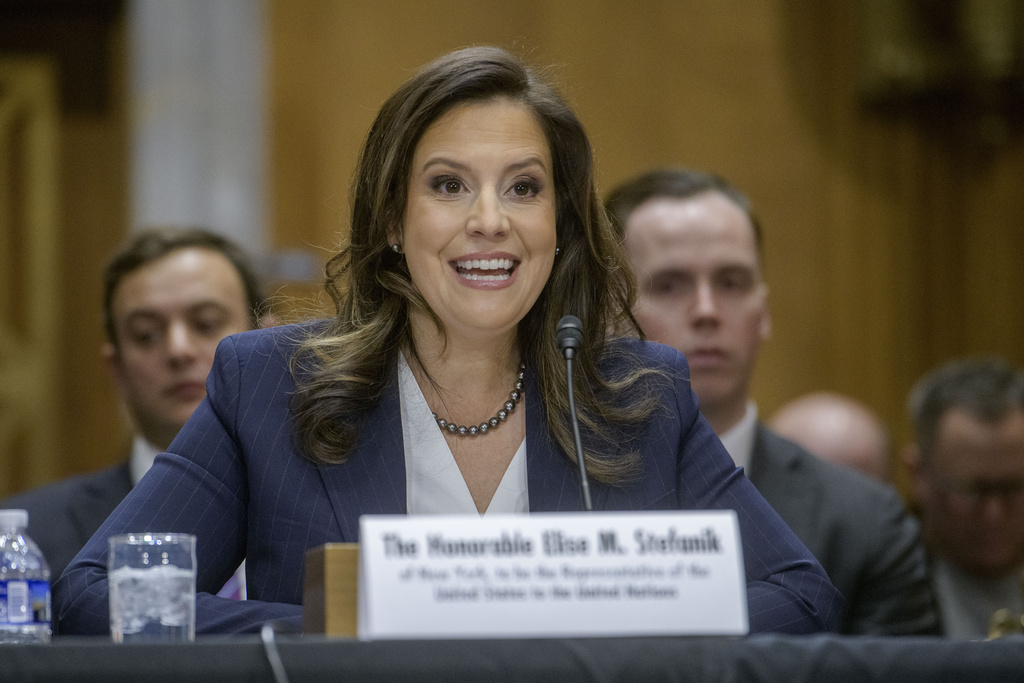Rep. Elise Stefanik opened her confirmation hearing Tuesday for U.S. ambassador to the United Nations by pledging to implement President Donald Trump’s “America First” mandate and roll out a review of U.S. funding for some of the world body’s agencies.
Noting that the U.S. is the largest single contributor to the United Nations, she pointed to the children’s agency UNICEF and the World Food Program as examples of U.N. entities that are “effective,” but said the U.S. has to ensure its investments are making America safer, stronger and more prosperous — echoing Secretary of State Marco Rubio.
“Our tax dollars should not be complicit in propping up entities that are counter to American interests, antisemitic, or engaging in fraud, corruption or terrorism,” Stefanik said in her opening remarks before the Senate Foreign Relations Committee.
She stressed the need to reform the world body, where lawmakers raised the ability of American adversaries Russia and China to veto resolutions in the U.N. Security Council, and went so far as to say that it has not lived up to its founding mission.
Sen. Jim Risch, the Republican committee chair, set the tone by sharply criticizing the U.N. at the start of the hearing, saying that Stefanik “can bring much-needed change” to the institution.
“At this point, the U.S. should seriously examine if further contributions and, indeed, participation in the U.N. is even beneficial to the American people,” the Idaho lawmaker said.
Stefanik echoed him, saying: Stefanik: “If you look at the antisemitic rot within the United Nations, there are more resolutions targeting Israel than any other country, any other crisis combined … We need to be a voice of moral clarity on the UN Security Council and the United Nations at large, for the world to hear the importance of standing with Israel.”
Harvard-educated and the fourth-ranking member of the U.S. House, Stefanik was elected to Congress in 2015 as a moderate Republican and is leaving a decade later as one of Trump’s most ardent allies.
Stefanik was asked about her views on the wars in Gaza, Ukraine, Sudan and elsewhere as well as the North Korean and Iranian nuclear programs — all issues on the U.N. agenda.
The United States pays about one-fifth of the U.N.’s regular budget, and she has already been questioned about her comments on cutting the U.N. budget and continuing support for its multiple agencies. Those tackle everything from health, education and migration to reproductive rights and nuclear proliferation.
She responded by saying she is open to reviewing agencies to ensure “that all of our taxpayer dollars are going to entities that function very well.”
But she also agreed with Democratic Sen. Chris Coons about supporting efforts to strengthen alliances, especially when it comes to China’s influence at the world body. Trump has been skeptical of U.S. alliances, including NATO and defense partnerships in the Asia-Pacific, which the Biden team worked to shore up after taking over from Trump after his first term.
Stefanik saw her profile rise after her aggressive questioning last year of a trio of university presidents about antisemitism on their campuses, leading to two of their resignations — a performance Trump repeatedly praised.
“I was interested in this position because if you look at the antisemitic rot within the United Nations, there are more resolutions targeting Israel than any other country, any other crisis combined,” Stefanik testified.
Stefanik most recently was the most senior and longest-serving woman on both the House Armed Services Committee and the coveted House committee that oversees national intelligence.
Stefanik was also tapped to be on a select committee focused on strategic competition between the U.S. and China and spent years as part of a group of House members negotiating the annual defense authorization bill, which determines funding for the military. In 2023, she also led a bipartisan delegation of members to the Indo-Pacific including Japan, Singapore and Thailand to meet with various government, military and cultural leaders in the region.
Born and raised in upstate New York, Stefanik worked in Bush’s White House on the domestic policy council and in the chief of staff’s office.
She was the youngest person in her freshman class in Congress — just 30 — and ascended to the House leadership team in 2021, becoming the only woman.
Unlike Rubio, who was confirmed in a unanimous vote Monday night, only one Democrat — Sen. John Fetterman of Pennsylvania — has publicly said he would vote to confirm Stefanik thus far.
But, many other Democrats have left meetings with her indicating their support, including Sen. Jacky Rosen of Nevada, who is Jewish and noted their discussions on how Stefanik “plans to push back on politically motivated actions” against Israel when at the U.N.
(AP)












2 Responses
“…Sen. Jacky Rosen of Nevada, who is Jewish…”
I think you’ll find that she is not Jewish. Her father was (or is) but her mother wasn’t (or isn’t).
You can’t be Jewish if your not religious and that means sacrifice, it’s just another biblical kick in the pants here